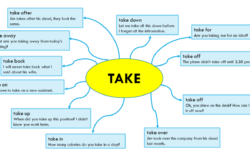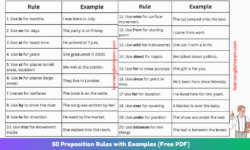Conjunctions in English: Guide with Examples & PDF
Are you struggling to make your English sentences flow naturally? This article is here to help — because (←yes, that’s a conjunction!) what you really need are conjunctions! In this guide, we’ll explain everything about them in a simple and fun way. Conjunctions are small but powerful words that connect other words, phrases, or sentences. They’re an essential part of speech because they make your writing and speaking clear, smooth, and more professional.
Without Conjunctions: She was tired. She kept working.
With Conjunctions: She was tired, but she kept working.
The conjunction but shows contrast and makes the sentence more natural.
In simple terms, a conjunction is a word that joins ideas together. Think of them as bridges that connect your thoughts so readers and listeners can follow you easily. Without conjunctions, your sentences would sound robotic, short, or confusing.
What Are Conjunctions?

Conjunctions are words that join words, phrases, or sentences. They are the glue of English, keeping your writing neat and your speech smooth.
Example:
- I like coffee and tea.
- She is tired, but she keeps working.
Why Conjunctions Are Important
| Without Conjunctions | With Conjunctions |
|---|---|
| I like coffee. I like tea. I like chocolate. I like cookies. Notice: The sentences are short, choppy, and robotic. It feels like a list of separate ideas. | I like coffee, and I like tea, and I like chocolate, and I like cookies. Notice: The conjunction and connects the ideas, making the sentence smooth and easy to read. |
The Three Main Types of Conjunctions
English conjunctions are divided into three main types, plus a bonus category called conjunctive adverbs.
1. Coordinating Conjunctions (FANBOYS)
These join words, phrases, or independent clauses of equal importance.
- For – reason/cause
- And – addition
- Nor – negative alternative
- But – contrast
- Or – choice/alternative
- Yet – contrast/surprise
- So – result/consequence

Examples:
- I want to eat pizza, but I’m full.
- We can go to the park or stay home.
- She brought snacks, drinks, and games.
2. Subordinating Conjunctions
These connect a dependent clause to an independent clause and show relationships like cause, time, condition, or contrast.
Common subordinating conjunctions:
after, although, as, as if, as long as, as much as, as soon as, because, before, even if, even though, if, if only, in case, in order that, lest, once, only if, provided that, rather than, since, so that, than, that, though, unless, until, when, whenever, where, whereas, wherever, whether, while, why
Examples:
- I stayed home because it was raining.
- Although she was tired, she studied.
- We can go out if you finish your homework.
3. Correlative Conjunctions

Correlative conjunctions always appear in pairs and work together to link ideas.
Common pairs:
both…and, either…or, neither…nor, not only…but also, whether…or, just as…so, such…that, scarcely…when, as many…as, rather…than, no sooner…than, as…as, not…but
Examples:
- Either you clean your room or you can’t play.
- She is not only smart but also funny.
- I want both chocolate and ice cream.
4. Conjunctive Adverbs
These adverbs act like conjunctions to connect independent clauses and usually require a semicolon or proper punctuation.
Common conjunctive adverbs:
accordingly, also, besides, consequently, conversely, finally, furthermore, hence, however, indeed, instead, likewise, meanwhile, moreover, nevertheless, next, nonetheless, otherwise, similarly, still, subsequently, then, therefore, thus
Examples:
- The food arrived late; therefore, it was cold.
- She studied hard; however, she failed the test.

Quick Tips to Master Conjunctions
- Start with FANBOYS—they’re easy and appear everywhere.
- Use commas properly, especially with full sentences joined by coordinating conjunctions.
- Mix types—combine subordinating, correlative, and coordinating conjunctions for variety.
- Make it fun—joke example: I told my computer a joke, but it didn’t laugh… maybe it didn’t get the connection!
Fun Exercise
Try connecting these ideas using different conjunctions:
- I love chocolate. I love vanilla.
- She wanted to go out. It started raining.
- You can watch TV. You can read a book.
Play around with and, but, because, either…or—your sentences will instantly sound smoother.
Conclusion
Conjunctions may be small words, but they do big work. They hold your sentences together, making your English readable, natural, and fun—like a basket keeping all your eggs safe.
Start practicing today, and soon your writing and speaking will flow like a perfectly brewed cup of tea…or coffee…or maybe both.



